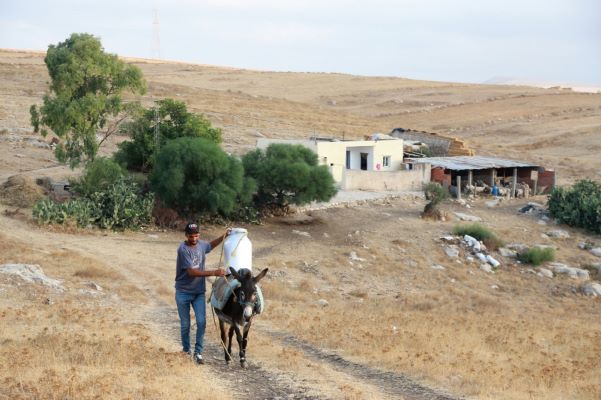In Béja, Tunisia, Mohamed Ali Gaidi takes his sheep out to graze at dusk.
This is his favourite part of the day as he walks with his sheep and observes their health.
Growing up in a rural area in one of the poorest parts of the country, Gaidi cultivated his passion for sheep farming:
“It’s a part of me, like breathing,” he said.
Gaidi is now one of the farmers in Tunisia specialising in breeding dairy sheep for cheese production.
He got certified in cheese production and bought a herd to start producing his own milk and focused on breeding the Sicilian-Sardinian variety of sheep, typical of the area where he lives.
This variety was brought to Tunisia from southern Italy at the beginning of the 20th century, but over time, the variety has weakened due to poor breeding techniques.
Today, the breed is in danger of disappearing as the number of herds decreases by the day.
Mohamed understands the importance of safeguarding this variety through good breeding techniques.
“My area has a cultural and agricultural heritage that is unfortunately about to disappear. There are only a few of us left who have preserved it,” he said.
Along with safeguarding this breed, Gaidi’s other priority is keeping up the quality of the milk, and he has a good reputation for it. He works in partnership with his childhood friend Fadi Hamzaoui, who runs a small cheese factory and restaurant where the local products are used.
Hamzaouib supported Mohamed in facing daily challenges, like getting the milk to the processing factory.
In Béja, like in many other poor rural areas, roads don’t often connect isolated houses like Gaidi’s. The regio is a hilly area, Gaidi has to rely on his donkey to carry the milk painstakingly up a dirt road to the dairy farm. But every day, Hamzaoui is there, halfway, waiting for him in his car to pick him up.
Hamzaoui also Gaidi to join him in applying to the “Agri-accelerator Hub”, an initiative launched by the Food and Agriculture Organisation (FAO), the Tunisian Agricultural Investment Promotion Agency and the National Agricultural Research Institute of Tunisia.
The initiative supports young people in establishing sustainable small-and medium-sized enterprises through responsible investments in agriculture and food systems.
“These would support the sustainable conservation of natural resources, benefitting the environment and the livelihoods of people in rural communities, with a focus on those in vulnerable situations,” FAO said.
Gaidi and Hamzaoui were trained with more 100 young agri-entrepreneurs between the ages of 18 and 40 in how to design and implement their projects.
The Hub, implemented as part of the sub-programme “Leveraging global instruments and knowledge products” funded by FAO’s Flexible Voluntary Contribution, helped young investors to refine their business plans through coaching and one-on-one incubation services.
Eighteen projects were selected to receive hands on coaching. A further ten were selected to receive material support, and Gaidi’s was one of these.
He was awarded with equipment for milk production that will help him to better preserve and transport the milk to the processing facility, maintaining the highest food safety standards despite the limited road network.
“His participation in the Hub was a decisive factor in improving his project and making his business more successful. He already had notions of environmentally friendly practices and the importance of healthy food, but the programme taught him more about farming methods that respect the land and the environment,” FAO said.
With new confidence, Gaidi put into practice what he had learned, and he has developed his own formula to feed the sheep using only natural ingredients.
Furthermore, he has designed new packaging for the cheese, using a straw base instead of plastic.
Due to his success, other young farmers in Béja see Gaidi as a leader and come to him for advice, and he is always willing to help them by sharing his knowledge and experience.
Caption: The FAO project has assisted Gaidi in obtaining equipment, such as cooling tanks for his milk.









[…] FAO helps young Tunisian farmer to venture into cheese production Farmers Review Africa Article Source […]
Comments are closed.